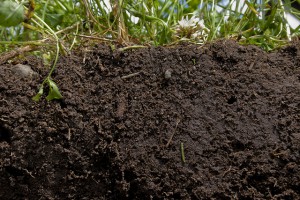Microbial communities in organic soils suppress pathogens
 Photo credit: Natural Resources Conservation Service Soil Health Campaign
Photo credit: Natural Resources Conservation Service Soil Health Campaign
Organic soils support much higher levels of biodiversity than conventional soils. It has been hypothesized that this abundance of ‘good’ soil organisms works to suppress soil pathogens such as fungi or bacteria that attack plant roots. A recent study published in the journal Applied Soil Ecology tested to see whether the soil pathogen flax wilt was suppressed more in organic soils than conventional soils. Three sets of organic and conventional soils were collected from the field, and a wide range of physical, chemical and biological properties were measured. Comparisons included, but were not limited to, the soil’s ability to hold water, total carbon, total nitrogen, pH, microbial biomass, and number of bacterial species. Flax plants were then planted in the soils and inoculated with the flax wilt pathogen. All soils were then disturbed by adding grass and clover. Researchers found that the microbial communities in organic soils were much more resilient, allowing them to more effectively suppress the flax wilt than microbial communities in conventional soils. These results corroborate the hypothesis that healthier, more resilient soil microbial communities commonly found in organic soils are important for pathogen suppression and key measures of soil health.



